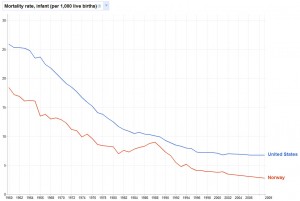Much has been said about the tragic events in Norway over the last days. It goes without saying that every compassionate person feels pain for the families of the victims and for the people of Norway. The actions of Anders Behring Breivik will be chronicled and debated for years to come — he killed 68 children, a day of violence that was both shocking and trafic. And so it is that I come to read articles like this one, calling for outrage at the slow response of Norway’s special police force.
International experts said Norway must take a hard look at a response system apparently premised on the assumption that the country didn’t face a credible risk of terrorist attack, much less a back-to-back bombing and gun rampage.
Andrew Silke, director of terrorism studies at the University of East London, called the police response “a bit Keystone Kops” because Norway’s police were “just not used to dealing with something like this. The system was swamped.”
Norway is being widely criticized for only having one police helicopter, based in Oslo. For not having an extensive terrorism response network. Confusion and delays abounded, and it is true, on 22 July, 68children were killed in Norway during this now infamous terrorist attack.
On that same day, in the United States, 77* children died, yet no one wrote an article about them. Their deaths went unreported in the media, unheard by the public, mostly because they were deaths of the more common causes infant mortality, not of bullets. Had the United States the same level of infant mortality as Norway, 45* of those children would not be dead. And on 23 July, the next day, when there were no terrorist attacks in Norway, yet another 45 extra children died in the United States. And on the next day, another 45. And on it will go.
 I do not mean to trivialize any deaths, nor reduce any life to a mere statistic. I would argue, however, that when we focus solely on terrorist killings and ignore other child deaths, we do trivialize. When reporters write articles where the implication is that Norwegian official risked the lives of the country’s children by not buying more helicopters and spending more money in counter-terrorism intelligence … is it not fair to say the same of deaths that occur every day in America? Do we not risk the lives of our country’s children when we fail to invest in measures that are known to reduce infant mortality?
I do not mean to trivialize any deaths, nor reduce any life to a mere statistic. I would argue, however, that when we focus solely on terrorist killings and ignore other child deaths, we do trivialize. When reporters write articles where the implication is that Norwegian official risked the lives of the country’s children by not buying more helicopters and spending more money in counter-terrorism intelligence … is it not fair to say the same of deaths that occur every day in America? Do we not risk the lives of our country’s children when we fail to invest in measures that are known to reduce infant mortality?
The article I linked above quotes Fernando Reinares, former senior anti-terrorism adviser to the Spanish government, as saying, “Norway is behind other Western European countries in adapting internal security structures and procedures to face terrorist challenges.” If Norway is behind other European nations in its terrorism prevention, would it not be fair to say that the United States is behind all other rich nations in its infant mortality prevention? Or prevention of child abuse? Or child malnutrition. Or child imprisonment. Or teen pregnancy. Should we not also call for the prevention of these maladies to be increased?
If the deaths of 68 in Norway could have in any way been prevented, then I agree the lack of prevention should be an outrage. And those deaths have been very visible, so there is much outrage over the possibility of measures that may have prevented some of them. In the U.S., however, every day many children die, and there seems to be no outrage. These are deaths from a silent kind of violence, a structural violence, and I ask when the outrage over these deaths will come.
*I calculated the numbers I used by taking the CDCs NVSS birth data for 2009 (4,131,019 births), dividing that number by 365 (11,318), and then using relevant infant mortality figures to calculate the total and excess deaths. The infant mortality figures were taken from World Bank indicators (Norway 2.8, United States 6.8).